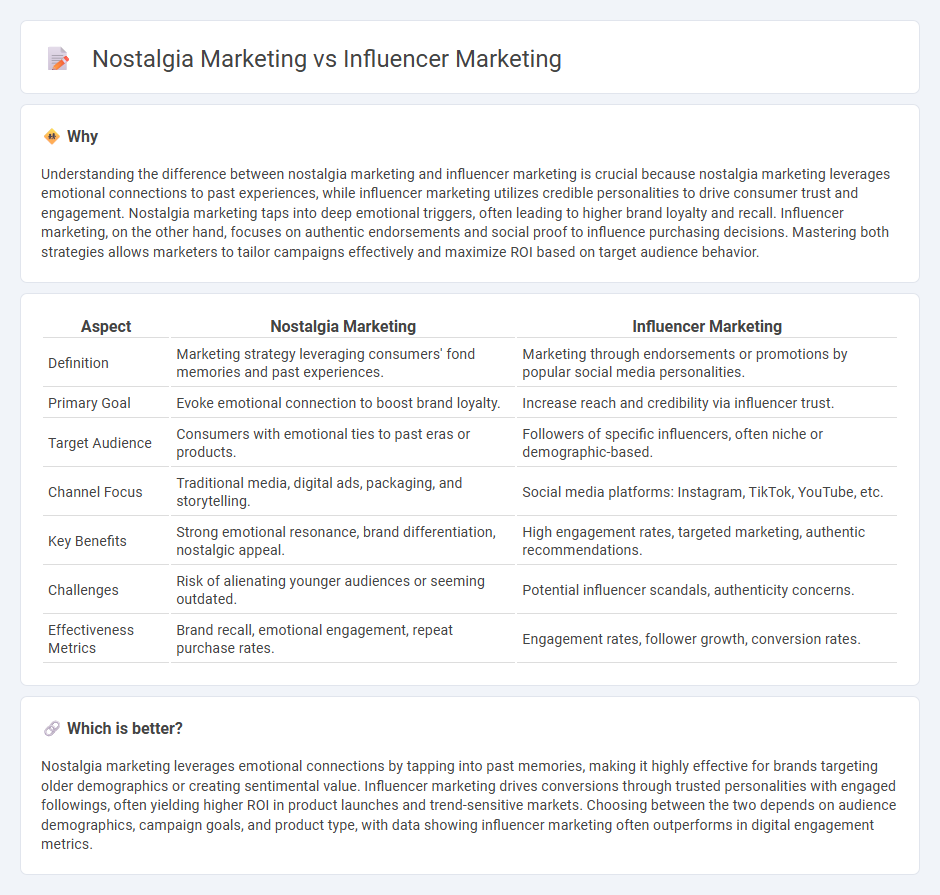
Nostalgia marketing leverages consumers' fond memories of past experiences to evoke emotional connections with a brand, often increasing brand loyalty and engagement. Influencer marketing harnesses the reach and trust of social media personalities to promote products, driving authentic audience interactions and higher conversion rates. Discover how these two powerful strategies can transform your marketing approach.
Why it is important
Understanding the difference between nostalgia marketing and influencer marketing is crucial because nostalgia marketing leverages emotional connections to past experiences, while influencer marketing utilizes credible personalities to drive consumer trust and engagement. Nostalgia marketing taps into deep emotional triggers, often leading to higher brand loyalty and recall. Influencer marketing, on the other hand, focuses on authentic endorsements and social proof to influence purchasing decisions. Mastering both strategies allows marketers to tailor campaigns effectively and maximize ROI based on target audience behavior.
Comparison Table
| Aspect | Nostalgia Marketing | Influencer Marketing |
|---|---|---|
| Definition | Marketing strategy leveraging consumers' fond memories and past experiences. | Marketing through endorsements or promotions by popular social media personalities. |
| Primary Goal | Evoke emotional connection to boost brand loyalty. | Increase reach and credibility via influencer trust. |
| Target Audience | Consumers with emotional ties to past eras or products. | Followers of specific influencers, often niche or demographic-based. |
| Channel Focus | Traditional media, digital ads, packaging, and storytelling. | Social media platforms: Instagram, TikTok, YouTube, etc. |
| Key Benefits | Strong emotional resonance, brand differentiation, nostalgic appeal. | High engagement rates, targeted marketing, authentic recommendations. |
| Challenges | Risk of alienating younger audiences or seeming outdated. | Potential influencer scandals, authenticity concerns. |
| Effectiveness Metrics | Brand recall, emotional engagement, repeat purchase rates. | Engagement rates, follower growth, conversion rates. |
Which is better?
Nostalgia marketing leverages emotional connections by tapping into past memories, making it highly effective for brands targeting older demographics or creating sentimental value. Influencer marketing drives conversions through trusted personalities with engaged followings, often yielding higher ROI in product launches and trend-sensitive markets. Choosing between the two depends on audience demographics, campaign goals, and product type, with data showing influencer marketing often outperforms in digital engagement metrics.
Connection
Nostalgia marketing leverages consumers' emotional connections to past experiences, enhancing brand loyalty and engagement. Influencer marketing amplifies this effect by using trusted personalities to evoke nostalgic feelings, making campaigns more relatable and authentic. Together, they create powerful storytelling strategies that drive consumer trust and purchase intent through emotional resonance.
Key Terms
Influencer Marketing:
Influencer marketing leverages popular social media personalities to promote products, driving engagement through authentic content and trusted recommendations. Brands achieve higher reach and conversion rates by targeting specific follower demographics and utilizing platform algorithms. Discover how influencer marketing can transform your brand visibility and customer loyalty strategies.
Authenticity
Influencer marketing leverages relatable personalities to build trust, enhancing brand authenticity through genuine content and personal endorsements. Nostalgia marketing taps into emotional memories, fostering authenticity by evoking positive associations and timeless values linked to past experiences. Explore how blending these strategies can amplify authentic engagement in your marketing campaigns.
Reach
Influencer marketing leverages popular social media personalities to maximize content reach and engage targeted audiences through authentic endorsements. Nostalgia marketing taps into consumers' emotional connections with the past, driving reach by resonating deeply with specific demographic groups who value sentimental experiences. Explore how each strategy amplifies brand presence and audience engagement to decide the best fit for your marketing goals.
Source and External Links
Influencer marketing - Wikipedia - Influencer marketing is a form of social media marketing involving endorsements and product placement from influencers who have credibility and influence over their audience's buying decisions on platforms like Instagram, TikTok, and YouTube, with growing emphasis on authenticity and transparency.
What Is Influencer Marketing? - Mailchimp - Influencer marketing enables businesses to collaborate with individuals who have specific followings for increased brand exposure, emphasizing the need for clear goals, audience alignment, and budgeting to create measurable and effective campaigns.
Influencer Marketing: All You Need to Know to Plan, Execute, and ... - Influencer marketing involves collaborating with professional influencers to expand brand awareness and trust, with tailored strategies per social platform and a focus on building long-term relationships for better ROI.
 dowidth.com
dowidth.com